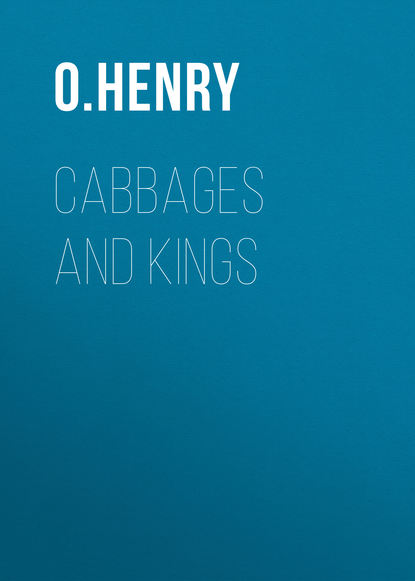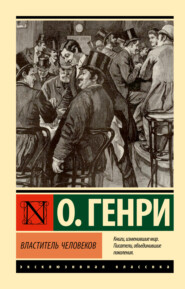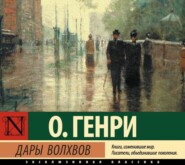По всем вопросам обращайтесь на: info@litportal.ru
(©) 2003-2025.
✖
Cabbages and Kings
Настройки чтения
Размер шрифта
Высота строк
Поля
At the answer the admiral would plump himself down with a great rattling of scabbard to await the infrequent tick of the little instrument on the table.
"They will come," would be his unshaken reply; "I am the admiral."
IX
THE FLAG PARAMOUNT
At the head of the insurgent party appeared that Hector and learned Theban of the southern republics, Don Sabas Placido. A traveller, a soldier, a poet, a scientist, a statesman and a connoisseur – the wonder was that he could content himself with the petty, remote life of his native country.
"It is a whim of Placido's," said a friend who knew him well, "to take up political intrigue. It is not otherwise than as if he had come upon a new tempo in music, a new bacillus in the air, a new scent, or rhyme, or explosive. He will squeeze this revolution dry of sensations, and a week afterward will forget it, skimming the seas of the world in his brigantine to add to his already world-famous collections. Collections of what? Por Dios! of everything from postage stamps to prehistoric stone idols."
But, for a mere dilettante, the æsthetic Placido seemed to be creating a lively row. The people admired him; they were fascinated by his brilliancy and flattered by his taking an interest in so small a thing as his native country. They rallied to the call of his lieutenants in the capital, where (somewhat contrary to arrangements) the army remained faithful to the government. There was also lively skirmishing in the coast towns. It was rumoured that the revolution was aided by the Vesuvius Fruit Company, the power that forever stood with chiding smile and uplifted finger to keep Anchuria in the class of good children. Two of its steamers, the Traveler and the Salvador, were known to have conveyed insurgent troops from point to point along the coast.
As yet there had been no actual uprising in Coralio. Military law prevailed, and the ferment was bottled for the time. And then came the word that everywhere the revolutionists were encountering defeat. In the capital the president's forces triumphed; and there was a rumour that the leaders of the revolt had been forced to fly, hotly pursued.
In the little telegraph office at Coralio there was always a gathering of officials and loyal citizens, awaiting news from the seat of government. One morning the telegraph key began clicking, and presently the operator called, loudly: "One telegram for el Almirante, Don Señor Felipe Carrera!"
There was a shuffling sound, a great rattling of tin scabbard, and the admiral, prompt at his spot of waiting, leaped across the room to receive it.
The message was handed to him. Slowly spelling it out, he found it to be his first official order – thus running:
Proceed immediately with your vessel to mouth of Rio Ruiz; transport beef and provisions to barracks at Alforan.
Martinez, General.
Small glory, to be sure, in this, his country's first call. But it had called, and joy surged in the admiral's breast. He drew his cutlass belt to another buckle hole, roused his dozing crew, and in a quarter of an hour El Nacional was tacking swiftly down coast in a stiff landward breeze.
The Rio Ruiz is a small river, emptying into the sea ten miles below Coralio. That portion of the coast is wild and solitary. Through a gorge in the Cordilleras rushes the Rio Ruiz, cold and bubbling, to glide, at last, with breadth and leisure, through an alluvial morass into the sea.
In two hours El Nacional entered the river's mouth. The banks were crowded with a disposition of formidable trees. The sumptuous undergrowth of the tropics overflowed the land, and drowned itself in the fallow waters. Silently the sloop entered there, and met a deeper silence. Brilliant with greens and ochres and floral scarlets, the umbrageous mouth of the Rio Ruiz furnished no sound or movement save of the sea-going water as it purled against the prow of the vessel. Small chance there seemed of wresting beef or provisions from that empty solitude.
The admiral decided to cast anchor, and, at the chain's rattle, the forest was stimulated to instant and resounding uproar. The mouth of the Rio Ruiz had only been taking a morning nap. Parrots and baboons screeched and barked in the trees; a whirring and a hissing and a booming marked the awakening of animal life; a dark blue bulk was visible for an instant, as a startled tapir fought his way through the vines.
The navy, under orders, hung in the mouth of the little river for hours. The crew served the dinner of shark's fin soup, plantains, crab gumbo and sour wine. The admiral, with a three-foot telescope, closely scanned the impervious foliage fifty yards away.
It was nearly sunset when a reverberating "hal-lo-o-o!" came from the forest to their left. It was answered; and three men, mounted upon mules, crashed through the tropic tangle to within a dozen yards of the river's bank. There they dismounted; and one, unbuckling his belt, struck each mule a violent blow with his sword scabbard, so that they, with a fling of heels, dashed back again into the forest.
Those were strange-looking men to be conveying beef and provisions. One was a large and exceedingly active man, of striking presence. He was of the purest Spanish type, with curling, gray-besprinkled, dark hair, blue, sparkling eyes, and the pronounced air of a caballero grande. The other two were small, brown-faced men, wearing white military uniforms, high riding boots and swords. The clothes of all were drenched, bespattered and rent by the thicket. Some stress of circumstance must have driven them, diable à quatre, through flood, mire and jungle.
"O-hé! Señor Almirante," called the large man. "Send to us your boat."
The dory was lowered, and Felipe, with one of the Caribs, rowed toward the left bank.
The large man stood near the water's brink, waist deep in the curling vines. As he gazed upon the scarecrow figure in the stern of the dory a sprightly interest beamed upon his mobile face.
Months of wageless and thankless service had dimmed the admiral's splendour. His red trousers were patched and ragged. Most of the bright buttons and yellow braid were gone from his jacket. The visor of his cap was torn, and depended almost to his eyes. The admiral's feet were bare.
"Dear admiral," cried the large man, and his voice was like a blast from a horn, "I kiss your hands. I knew we could build upon your fidelity. You had our despatch – from General Martinez. A little nearer with your boat, dear Admiral. Upon these devils of shifting vines we stand with the smallest security."
Felipe regarded him with a stolid face.
"Provisions and beef for the barracks at Alforan," he quoted.
"No fault of the butchers, Almirante mio, that the beef awaits you not. But you are come in time to save the cattle. Get us aboard your vessel, señor, at once. You first, caballeros – á priesa! Come back for me. The boat is too small."
The dory conveyed the two officers to the sloop, and returned for the large man.
"Have you so gross a thing as food, good admiral?" he cried, when aboard. "And, perhaps, coffee? Beef and provisions! Nombre de Dios! a little longer and we could have eaten one of those mules that you, Colonel Rafael, saluted so feelingly with your sword scabbard at parting. Let us have food; and then we will sail – for the barracks at Alforan – no?"
The Caribs prepared a meal, to which the three passengers of El Nacional set themselves with famished delight. About sunset, as was its custom, the breeze veered and swept back from the mountains, cool and steady, bringing a taste of the stagnant lagoons and mangrove swamps that guttered the lowlands. The mainsail of the sloop was hoisted and swelled to it, and at that moment they heard shouts and a waxing clamour from the bosky profundities of the shore.
"The butchers, my dear admiral," said the large man, smiling, "too late for the slaughter."
Further than his orders to his crew, the admiral was saying nothing. The topsail and jib were spread, and the sloop glided out of the estuary. The large man and his companions had bestowed themselves with what comfort they could about the bare deck. Belike, the thing big in their minds had been their departure from that critical shore; and now that the hazard was so far reduced their thoughts were loosed to the consideration of further deliverance. But when they saw the sloop turn and fly up coast again they relaxed, satisfied with the course the admiral had taken.
The large man sat at ease, his spirited blue eye engaged in the contemplation of the navy's commander. He was trying to estimate this sombre and fantastic lad, whose impenetrable stolidity puzzled him. Himself a fugitive, his life sought, and chafing under the smart of defeat and failure, it was characteristic of him to transfer instantly his interest to the study of a thing new to him. It was like him, too, to have conceived and risked all upon this last desperate and madcap scheme – this message to a poor, crazed fanatico cruising about with his grotesque uniform and his farcical title. But his companions had been at their wits' end; escape had seemed incredible; and now he was pleased with the success of the plan they had called crack-brained and precarious.
The brief, tropic twilight seemed to slide swiftly into the pearly splendour of a moonlit night. And now the lights of Coralio appeared, distributed against the darkening shore to their right. The admiral stood, silent, at the tiller; the Caribs, like black panthers, held the sheets, leaping noiselessly at his short commands. The three passengers were watching intently the sea before them, and when at length they came in sight of the bulk of a steamer lying a mile out from the town, with her lights radiating deep into the water, they held a sudden voluble and close-headed converse. The sloop was speeding as if to strike midway between ship and shore.
The large man suddenly separated from his companions and approached the scarecrow at the helm.
"My dear admiral," he said, "the government has been exceedingly remiss. I feel all the shame for it that only its ignorance of your devoted service has prevented it from sustaining. An inexcusable oversight has been made. A vessel, a uniform and a crew worthy of your fidelity shall be furnished you. But just now, dear admiral, there is business of moment afoot. The steamer lying there is the Salvador. I and my friends desire to be conveyed to her, where we are sent on the government's business. Do us the favour to shape your course accordingly."
Without replying, the admiral gave a sharp command, and put the tiller hard to port. El Nacional swerved, and headed straight as an arrow's course for the shore.
"Do me the favour," said the large man, a trifle restively, "to acknowledge, at least, that you catch the sound of my words." It was possible that the fellow might be lacking in senses as well as intellect.
The admiral emitted a croaking, harsh laugh, and spake.
"They will stand you," he said, "with your face to a wall and shoot you dead. That is the way they kill traitors. I knew you when you stepped into my boat. I have seen your picture in a book. You are Sabas Placido, traitor to your country. With your face to a wall. So, you will die. I am the admiral, and I will take you to them. With your face to a wall. Yes."
Don Sabas half turned and waved his hand, with a ringing laugh, toward his fellow fugitives. "To you, caballeros, I have related the history of that session when we issued that O! so ridiculous commission. Of a truth our jest has been turned against us. Behold the Frankenstein's monster we have created!"
Don Sabas glanced toward the shore. The lights of Coralio were drawing near. He could see the beach, the warehouse of the Bodega Nacional, the long, low cuartel occupied by the soldiers, and, behind that, gleaming in the moonlight, a stretch of high adobe wall. He had seen men stood with their faces to that wall and shot dead.
Again he addressed the extravagant figure at the helm.
"It is true," he said, "that I am fleeing the country. But, receive the assurance that I care very little for that. Courts and camps everywhere are open to Sabas Placido. Vaya! what is this molehill of a republic – this pig's head of a country – to a man like me? I am a paisano of everywhere. In Rome, in London, in Paris, in Vienna, you will hear them say: 'Welcome back, Don Sabas.' Come! —tonto– baboon of a boy – admiral, whatever you call yourself, turn your boat. Put us on board the Salvador, and here is your pay – five hundred pesos in money of the Estados Unidos– more than your lying government will pay you in twenty years."
Don Sabas pressed a plump purse against the youth's hand. The admiral gave no heed to the words or the movement. Braced against the helm, he was holding the sloop dead on her shoreward course. His dull face was lit almost to intelligence by some inward conceit that seemed to afford him joy, and found utterance in another parrot-like cackle.
"That is why they do it," he said – "so that you will not see the guns. They fire – oom! – and you fall dead. With your face to the wall. Yes."
The admiral called a sudden order to his crew. The lithe, silent Caribs made fast the sheets they held, and slipped down the hatchway into the hold of the sloop. When the last one had disappeared, Don Sabas, like a big, brown leopard, leaped forward, closed and fastened the hatch and stood, smiling.
"No rifles, if you please, dear admiral," he said. "It was a whimsey of mine once to compile a dictionary of the Carib lengua. So, I understood your order. Perhaps now you will – "
He cut short his words, for he heard the dull "swish" of iron scraping along tin. The admiral had drawn the cutlass of Pedro Lafitte, and was darting upon him. The blade descended, and it was only by a display of surprising agility that the large man escaped, with only a bruised shoulder, the glancing weapon. He was drawing his pistol as he sprang, and the next instant he shot the admiral down.

















